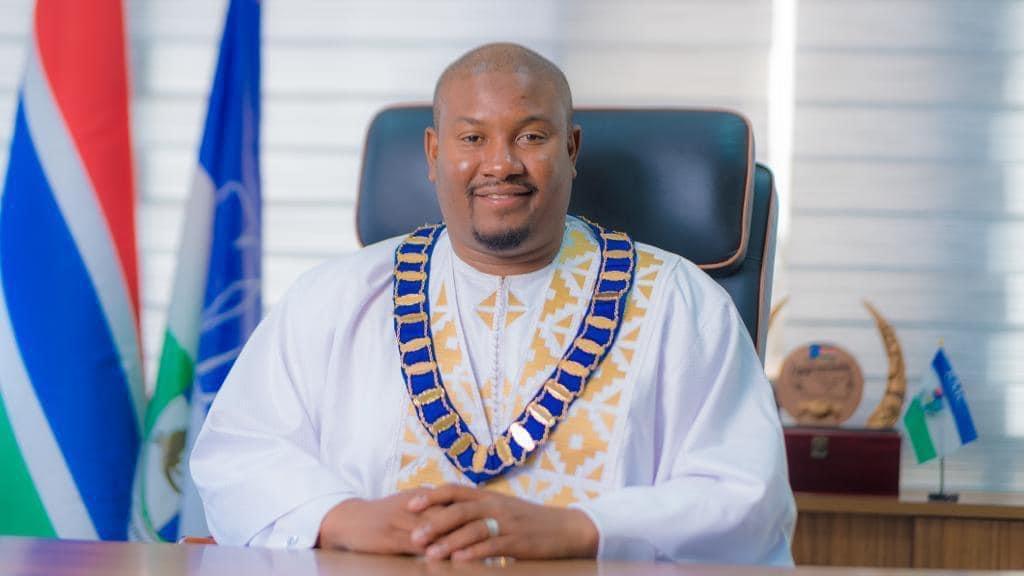Africa-Press – Gambia. Kanifing Municipal Council has raised concerns over persistent confusion and inefficiencies in local government councils caused by unclear roles and responsibilities between mayors and chief executive officers (CEOs).
Appearing before the Local Government Commission on Monday, Mayor Bensouda explained that the absence of a clearly defined authority between mayors and CEOs has often resulted in operational conflicts and hindered effective council management.
“The law does not provide us the tools to exercise the authority we should have as mayors; that is why in apprehension we wrote to the ministry to correct the issue,” he said.
He noted that CEOs are not directly accountable to mayors, adding that disagreements over council matters often require deliberation by the general council. “When I disagree with certain actions of the CEO, I refer the matter to the general council for discussion and resolution,” he explained.
Mayor Bensouda emphasized that this lack of clarity in roles leads to dysfunctionality across councils. “Because there are no clear roles. The CEO can come and say, “I am not responsible,” and the mayor can come and say, “I am not responsible because there is confusion.”
He cited a dispute in his council two months ago, during which the CEO reportedly stated, “I am answerable to the minister because they are the ones who appointed me.” The mayor highlighted that without the authority to appoint, he cannot dismiss or direct a CEO, citing the Kanifing Municipal Council (KMC) case involving former CEO Sainabou Martin Sonko as an example.
“KMC is the best example with our case with the former CEO Sainabou Martin Sonko,” he noted.
During the session, Counsel Gomez questioned Mayor Bensouda about a loan taken by former CEO Martin Sonko from Agib Bank for staff welfare, with the council acting as guarantor. He asked whether the mayor had contacted the bank to stop the disbursement. “Did you not call the bank and make sure you put a stop to the disbursement?” Gomez asked.
The mayor explained that he took action after realizing that CEO Martin Sonko had engaged in an illegal transaction.
Counsel argued that the transaction could not be considered illegal, asserting, “She is the boss.”
Mayor Bensouda countered, “It is illegal because she used the council as a guarantor, and she expressed that she got the council as a guarantee, which are all fraudulent and illegal.”
Counsel Gomez responded that the merits of the issue would be addressed later, noting that while they do not fully endorse the CEO’s actions, they believe there are numerous matters in which CEO Martin Sonko has acted improperly.
The counsel pressed on, “But I am bringing up the issue of the CEO and the issue that you call the bank to understand which powers you were exercising.”
Mayor Bensouda testified that he contacted the bank to warn that, should they proceed with the transaction, they would face the full authority of the council, as doing so would amount to facilitating criminal activity. He emphasized that he acted both as a council member and as chair of the general council, stating, “If I see that somebody has broken the laws of the council and the Gambia. It is my responsibility to step in.”
He further informed the counsel that these actions were duly recorded in the evidence.
The counsel then clarified that he wanted the discussion to focus specifically on the legal authority under which Mayor Bensouda acted to halt the transaction.
“When you told the bank that if they proceeded with that, they would face the full force of the law, you were not in a position to do that without a general council resolution,” Counsel Gomez added.
Mayor Bensouda disagreed, stating that he was in a position to warn the bank that proceeding would constitute a breach of the law. He explained that after notifying the bank, he escalated the matter to the General Council, where he successfully secured a resolution.
He further elaborated that the CEO had previously approached him to discuss the issue. At that time, he informed her that the council did not have the authority to take out loans without the explicit written approval of the Minister of Local Government.
Mayor Bensouda added that he also cautioned her that the council could not risk taxpayers’ funds—intended for building markets and supporting communities—on a loan that might default. He advised, “I told her to go look for banks that can support their action.”
He added, “She came back and said there is a bank that is willing to give them these facilities with the council as guarantor. I said no, the bank should be able to use the land you are to buy as collateral, so this is something that the council cannot commit to.”
He informed the commission that the law clearly prohibits such actions, and on that basis, he contacted the bank.
Counsel Gomez challenged this, arguing that the bank recognized his authority and that the mayor was fully aware of his powers, which he exercised when it suited him.
“Where you do not want to take responsibility, you want to disregard and come up with a technicality,” the counsel asserted.
Mayor Bensouda disagreed, explaining that this was precisely why he had referred the counsel to the statement they themselves submitted to the Minister of Local Government.
For More News And Analysis About Gambia Follow Africa-Press






